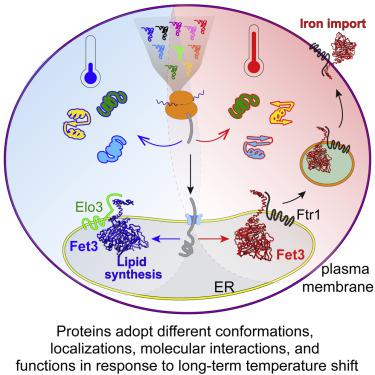Molecular Cell ( IF 14.5 ) Pub Date : 2021-07-21 , DOI: 10.1016/j.molcel.2021.06.028 Matthew Domnauer 1 , Fan Zheng 2 , Liying Li 3 , Yanxiao Zhang 4 , Catherine E Chang 2 , Jay R Unruh 5 , Juliana Conkright-Fincham 5 , Scott McCroskey 5 , Laurence Florens 5 , Ying Zhang 5 , Christopher Seidel 5 , Benjamin Fong 2 , Birgit Schilling 1 , Rishi Sharma 2 , Arvind Ramanathan 6 , Kausik Si 7 , Chuankai Zhou 1

|
Temperature is a variable component of the environment, and all organisms must deal with or adapt to temperature change. Acute temperature change activates cellular stress responses, resulting in refolding or removal of damaged proteins. However, how organisms adapt to long-term temperature change remains largely unexplored. Here we report that budding yeast responds to long-term high temperature challenge by switching from chaperone induction to reduction of temperature-sensitive proteins and re-localizing a portion of its proteome. Surprisingly, we also find that many proteins adopt an alternative conformation. Using Fet3p as an example, we find that the temperature-dependent conformational difference is accompanied by distinct thermostability, subcellular localization, and, importantly, cellular functions. We postulate that, in addition to the known mechanisms of adaptation, conformational plasticity allows some polypeptides to acquire new biophysical properties and functions when environmental change endures.
中文翻译:

响应持续环境变化的蛋白质组可塑性
温度是环境的可变组成部分,所有生物都必须应对或适应温度变化。剧烈的温度变化会激活细胞应激反应,导致受损蛋白质重新折叠或去除。然而,生物体如何适应长期的温度变化在很大程度上仍未被探索。在这里,我们报告出芽酵母通过从伴侣诱导转变为减少温度敏感蛋白并重新定位其部分蛋白质组来应对长期高温挑战。令人惊讶的是,我们还发现许多蛋白质采用另一种构象。以 Fet3p 为例,我们发现温度依赖性构象差异伴随着明显的热稳定性、亚细胞定位,以及重要的细胞功能。我们假设,











































 京公网安备 11010802027423号
京公网安备 11010802027423号